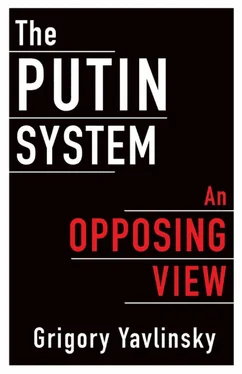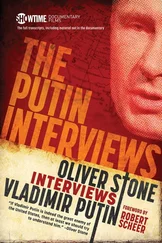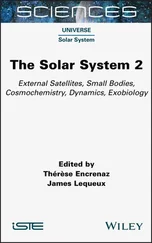If we take an unbiased, impartial look at world politics, we notice that the competition among the countries within the global capitalist core is more intense than the competition between the core countries and the global periphery. This is like the animal world, where competition within the same species is far more acute than competition between different species. Individual companies and their groups tussle with each other over markets, and thus over the promise of future big revenues, more fiercely than did medieval princes fighting over new territories that they sought to utilize and to plunder. The frenzy and the scale of plotting, as well as the pressure, arm-twisting, and resources expended in this economic warfare, are such that many of the wars waged over the past centuries look like Boy Scouts’ games in comparison.
And certainly, had Russia been able to accomplish a historic leap from the global semiperiphery (where it belonged at the peak of the Soviet period) into the core of global capitalism, its relations with the other parts of this core would not have been tranquil by any means. Yes, Russia would have had to give consideration to the stronger powers and to yield to them on a number of issues. But, at the same time, Russia would have been able to elbow its way among competing powers and into those areas where it might amass a prevailing concentration of resources; it would have been able to build coalitions, to plot intrigues if needed, and to achieve its goals. As a result, it would have been able to grow not just in relative but also in absolute terms, thus raising its status in the global pecking order of wealth, power, and influence.
Unfortunately, history turned in such a way that Russia lost this opportunity for the long haul. Nothing that has happened so far is truly irreversible, and yet, once the steamroller has accelerated to a certain speed, it is hard to stop, especially if the driver has no intention of doing so and, quite the contrary, is thrilled to see everybody else freaking out and running for cover.
Nonetheless, a steamroller is only good for what it is designed to do: to pave over everything on its path. It is not for road racing or for honing survival skills. In the global race of industrial, postindustrial, and simply modern economies, authoritarian regimes are bound to lose over the long haul—unless they begin to evolve in the direction of advanced, competition-based systems that are equipped with the tools needed to identify and achieve collective societal goals, to ensure “positive selection” of talent in public service, to self-adjust, and to safeguard against foolishness and major blunders with long-term repercussions. However, Russia’s political system is not only not moving in this direction but is in fact drifting the opposite way.
These days, many people are saying that Russia has reverted to Soviet times, meaning the later part of the Soviet period, the so-called age of stagnation from the late 1960s to the early 1980s, under Leonid Brezhnev. Others are saying that in fact the Soviet era never ended in Russia. However, this isn’t true. The present-day situation in Russia is not a return to the period before perestroika. Rather, it is an attempt by the authorities to leapfrog even further back in history, into Russia’s remote past, by juxtaposing it with the European—or, as we tend to say these days, the Western—world in a contrived, vulgar, and manipulative manner. This is the undoing of what has been achieved in every direction of the country’s development, from modern public institutions and the organization of its economic life to culture, education, and ideology.
This is nothing but an attempt to step aside from the actual struggle for Russia’s place under the sun, to dodge this struggle by indulging in the elite’s weaknesses, fears, and illusory dreams about building its own “Russian civilization.” It is an attempt to hide from actual problems and from having to look for rational and sustainable solutions for them. The elite try to escape from this by freezing all development in society and supplanting it with the pointless pursuit of nonexistent or fake mental constructs. This is an irresponsible attempt to distract the public from actual present risks by warning of bogus “mortal dangers,” and it shows an equally irresponsible willingness to endanger the future of Russia’s statehood in its present shape and boundaries. Finally, it is an explicit attempt to make the territory of a huge country, which is not at all devoid of any promise, into a global wasteland with no prospects of becoming one of the actual world leaders of the twenty-first century.
How long will they continue this insanity, this dangerous game in which the fate of the country and its people is at stake? The future is fickle, and at present it is impossible to give a definitive answer to this question. Certainly, it will depend to a significant extent upon the external environment, that is, upon the behavior of other international actors. Regardless, the duty of all healthy political forces in Russia is to make an effort to develop and to put forward a realistic alternative, a truly practical plan to overcome the present crisis. If necessary, this plan may need to be imposed upon Russia’s fearful and disoriented political elite, which may have to be forced to fulfill its responsibilities toward the country and its people.
5
IN LIEU OF A CONCLUSION
All the actual and potential dangers emanating from Russia’s current political regime amount to a tragic grotesque, from the standpoint of historical development. The political system of present-day Russia is the expression and embodiment of the mind-set of the group of people that have been ruling it for more than twenty years. This mind-set is virtually devoid of any serious ideological frameworks of analysis, has no bedrock values beyond individual wants, and worships personal consumption and enrichment. The ruling group tries to give an ideological twist to its policies, of a kind that appeals to the most basic clannish, tribal instincts of a premodern type and to the subconscious fear of the outside world.
Yet this group actually rejects all those values that have a societal dimension and that extend beyond the horizon of individual physical existence. In the minds of its members, maximizing personal satisfaction by taking advantage of their resources of power and influence and by asserting their superiority over those who are weaker and socially vulnerable invariably prevails over the long-term interests of the body of citizens that make up today’s Russia. And, paradoxical as it may be, this means that the ruling group welcomes and approves of the trend of Russia’s population becoming less sophisticated in their ways of thinking and in their practices, in the organization and the content of their involvement with one another.
In other words, this political system maximizes the demodernization and destruction of society and minimizes everything that imparts substantive meaning, ethics, grace, and constructive development. In essence, it is a variety of a political postmodernism of sorts. It supplants meaning with shiny objects and symbols that affect the subconscious and are not intended to be thought through or analyzed in relation to other concepts. In this regard, it is telling that the present-day insignia of the Russian state eclectically combines the coat of arms of the imperial Russia, the Soviet-era anthem, and the “democratic” flag. Essentially, this is a senseless mix of disparate historical cues. And, in themselves, these symbols belong entirely to the past, which is yet another illustration of the congenital inability of this “Putin system” to solve the problems of Russia’s present and future. Instead, these problems are being cold-bloodedly pushed aside—not even to the back burner but all the way to the bottom of the agenda.
Читать дальше












